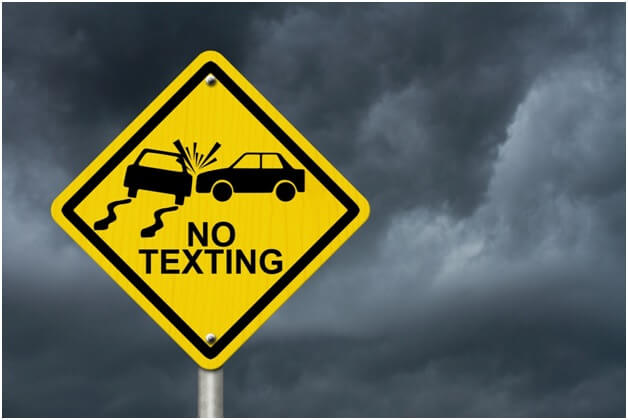Despite the overwhelming evidence that texting while driving is dangerous, all too many drivers are still deciding that using their smartphones can’t wait until they get to their destination. One of the latest tragic tales of a texting accident comes from North Carolina, where a young woman died seconds after posting a Facebook status about Pharrell Williams’ popular song “Happy.”
Police believe that 32-year-old Courtney Ann Sanford was driving in High Point, NC, when she posted the Facebook comment “The happy song makes me so HAPPY” at 8:33 pm on April 24th. Less than a minute after that comment went live, the High Point Police Department received a call about a car accident. The collision occurred when Sanford crossed the center median and drove headlong into an oncoming truck. The truck driver, 73-year-old John Wallace Thompson, was thankfully not injured, but Sanford’s Toyota Corolla caught on fire, and Sanford died at the scene.
Investigators found that Sanford was wearing a seat belt, but that it wasn’t secured properly. Police have also determined that she was not under the influence of drugs or alcohol, and that the most likely cause of the accident was Sanford’s use of her cell phone. High Point Lieutenant Chris Weisner said of this preventable tragedy, “In a matter of seconds, a life was over just so she could notify some friends that she was happy. As sad as it is, it is a grim reminder for everyone… you just have to pay attention while you are in the car.”
Despite Texting Bans, Distracted Driving is Still a Problem
In January 2014, Pew Research reported that 90% of American adults own a cell phone, and 58% of American adults have a smartphone. We’re living in a constantly connected culture, where people have become used to being able to reach their friends and family or access the internet wherever they go—even if they’re behind the wheel.
With anywhere from 387,000 to 421,000 Americans being injured in distracted driving-related accidents each year, state laws are finally beginning to catch up and discourage risky driving behavior. 43 states, as well as DC, Puerto Rico, Guam, and the US Virgin Islands, currently ban all texting while driving (Florida enacted a texting ban just this last October). 12 states also prohibit the use of all handheld phones while driving, although hands-free devices like those that use Bluetooth are still acceptable.
Unfortunately, the penalties for texting and driving vary from state to state and are often not severe enough to deter drivers who are truly determined to use their phone while they’re on the go. In Florida, for example, texting while driving is only a secondary offense (meaning a police officer has to have a primary reason for pulling a driver over before ticketing them for texting), and a first-time offense results in a fine of $30—little more than a slap on the wrist. In North Carolina, where Sanford’s accident occurred, texting while driving is a primary offense, and violators face a $100 fine, as well as court costs. Although North Carolina’s law is stricter than Florida’s, it still was not a strong enough deterrent to keep Sanford from using Facebook while driving.
Technology distractions are still a huge problem for drivers, with the CDC estimating that 1 in 5 crashes resulting in injuries were caused by distracted driving. In spite of texting bans and statistics that prove how hazardous distracted driving is, drivers who want to use their phone continue to get into the mindset that they’re capable of multitasking behind the wheel.
We Think We Can Multitask (But We Can’t)
Perhaps one of the most common rationales behind texting and driving is that the driver thinks they are “good at multitasking.” They may think that they’ve got glancing back and forth between their screen and the road down to a science, and that their acute perception makes them better at texting while driving than other people on the road.
In reality, the human brain doesn’t multitask in the way many of us think it does. David Strayer, a cognitive psychologist at the University of Utah, has been working to bust the myth that people can successfully juggle multiple tasks at once. He told Psychology Today, “Our brains don’t do two things at once; instead, we rapidly switch between tasks, putting heavy burdens on attention, memory, and focus.” He added, “Talking on a cellphone while driving (perhaps the most ubiquitous type of multi-tasking) leaves people as cognitively impaired as if they’d had two or three drinks.”
Note that Mr. Strayer is discussing talking on the phone, an activity that doesn’t even take a driver’s eyes off the road. Texting or posting social media updates, which take a driver’s eyes off the road for an average of 5 seconds, obviously creates an even bigger impairment.
What Will Get Drivers to Stop Texting?
Although it was a horrible event, Sanford’s fatal accident – which received wide coverage due to its tragic irony—will hopefully serve as a wake-up call to other drivers who have thus far paid little attention to state texting bans. Sanford’s accident shows just how quickly someone can go from using their phone while driving to losing their life, all because they couldn’t wait until they parked to update their Facebook status.
We can only hope that these personal, emotional stories hit home more than distracted driving statistics and texting laws have so far. Anyone who has ever texted or updated their Facebook status while driving should reflect on Sanford’s accident. Maybe doing this will help them to recognize that they put themselves and other drivers in a potentially dangerous situation by allowing technology to distract them. While many of us consider it a modern necessity to constantly be available to our online contacts, we need to remember that no matter what message we need to share, it can always wait until we get to our destination or find a spot to safely pull over.






